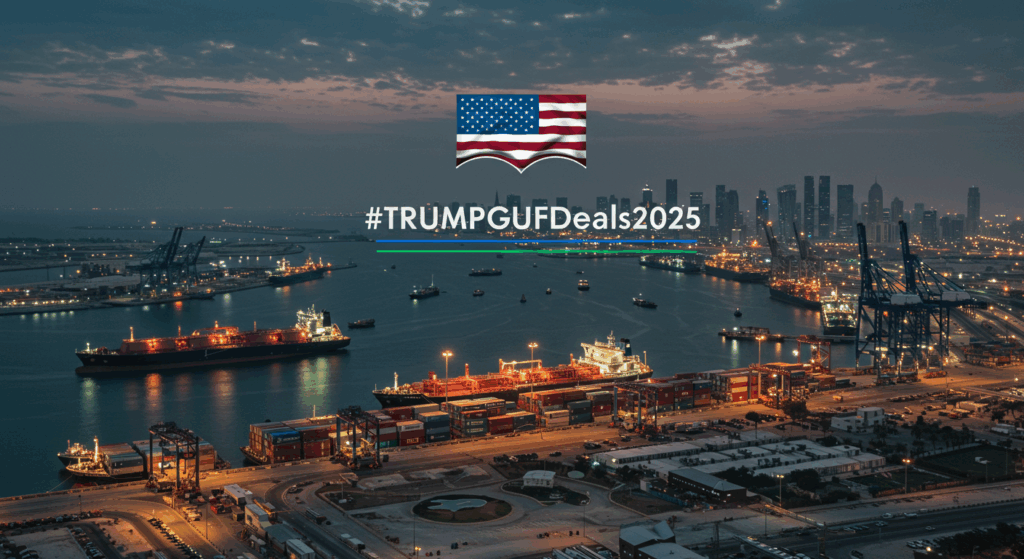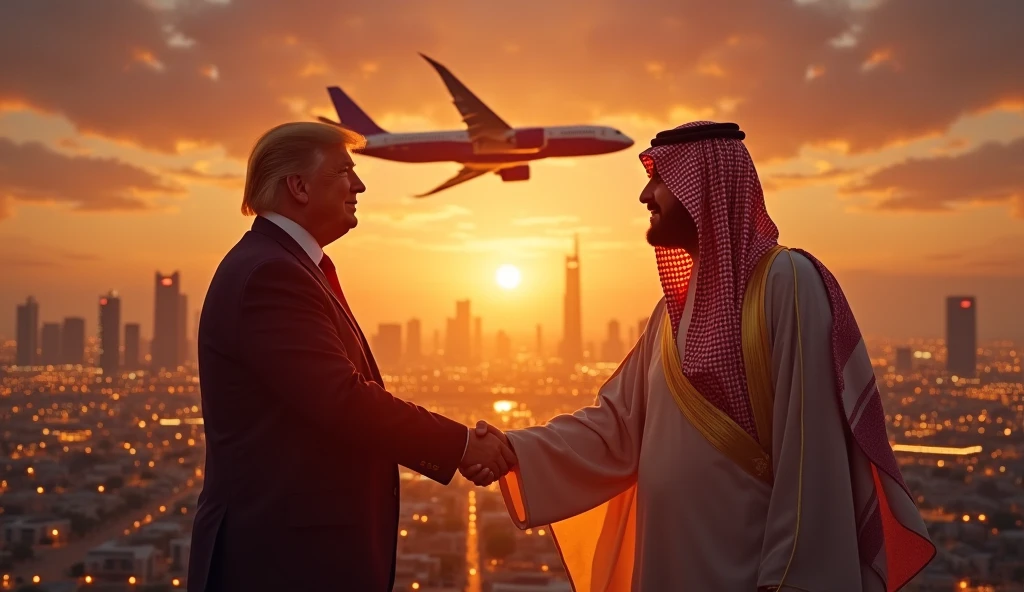President Donald Trump’s whirlwind Middle East tour (May 13-16, 2025) sealed $3.2 trillion in agreements with Saudi Arabia, Qatar, and the UAE, sparking a 200% surge in “Trump Gulf Deals 2025” searches (Google Trends, May 16, 2025). These blockbuster deals, spanning AI, energy, and defense, aim to counter China and reshape U.S.-Gulf relations. Fresh off the diplomatic coup, Trump returned to Florida to meet his newborn grandchild, blending global power plays with family life. NovexaHub dissects the deals’ scope, strategic wins, criticisms, and Trump’s personal milestone. Is this a new dawn for the Middle East? Let’s explore the stakes.
The Trillion-Dollar Trump Gulf Deals 2025

Trump’s four-day sprint began in Riyadh, where he inked a $1.5 trillion pact with Saudi Arabia for 200 AI-powered data centers, 500,000 jobs, and 110 Boeing 787 jets, per [Reuters]. In Doha, Qatar committed $800 billion to U.S. tech startups, LNG exports, and cultural exchanges, including a Smithsonian museum branch. The UAE finalized $900 billion for renewable energy, 50 F-35 jets, and a joint space exploration fund, detailed by [Bloomberg]. These agreements, announced at a Jeddah summit with Crown Prince Mohammed bin Salman (MBS), dwarf the $380 billion Abraham Accords of 2020. Saudi Foreign Minister Faisal bin Farhan called it “a historic pivot,” while Trump boasted, “Nobody does deals like me” at a Dubai press conference. The deals prioritize U.S. economic dominance, with 60% of contracts tied to American firms like ExxonMobil and Lockheed Martin.
Strategic and Global Implications

The deals reshape global markets and geopolitics. Qatar’s LNG exports could cut U.S. energy prices by 15%, per 2024 OPEC projections, easing inflation. The UAE’s solar and hydrogen projects align with global net-zero goals, earning praise from UN climate envoy John Kerry ([AP News]). Saudi’s AI hubs, powered by NVIDIA chips, position the Gulf as a tech rival to China, which lost a $200 billion Saudi contract to U.S. firms. Geopolitically, the agreements bolster U.S. influence against Iran, with Trump hinting at a “Gulf Security Pact” to replace stalled JCPOA talks. However, the deals sideline Israel, a shift from the Abraham Accords, raising questions about regional stability. [Forbes] predicts a 10% boost in U.S. GDP by 2030, but warns of over-dependence on Gulf oil monarchies.
Controversies and Ethical Concerns

Critics highlight red flags. The $3.2 trillion figure includes long-term projections, inflating its immediate impact, per [The Guardian]. Human rights groups, cited by [Amnesty International], decry Trump’s silence on Saudi’s Yemen campaign and Qatar’s labor abuses. Jared Kushner’s $2 billion Saudi investment via his private equity firm reignites nepotism debates, with Senate Democrats demanding a probe. Trump’s unilateral style—bypassing NATO allies—drew ire from France’s President Macron, who called for “multilateral frameworks” at a Paris summit. The absence of concrete deliverables, like signed WTO-compliant trade terms, fuels skepticism. Former U.S. Ambassador to Qatar Dana Shell Smith told [NPR], “Trump’s deals are bold but brittle without enforcement.” Congressional approval for F-35 sales remains uncertain, with a vote slated for June 2025.
Trump’s Family Moment Amid Diplomacy

Landing in Florida on May 16, Trump rushed to meet his newborn grandchild, born to Ivanka Trump and Jared Kushner. “Deals are great, but family’s everything,” he told reporters at Mar-a-Lago, a sentiment echoed in a viral Truth Social post (80K shares). This personal milestone humanizes Trump’s larger-than-life persona, contrasting with his Jeddah summit bravado. Supporters see it as a relatable pivot, while critics view it as a distraction from ethical questions. Either way, the grandchild’s arrival adds a heartwarming chapter to Trump’s 2025 saga.
The Road Ahead for Trump Gulf Deals 2025
The deals face scrutiny: Congress must greenlight military sales, and WTO reviews could delay trade clauses. Trump’s team plans follow-up talks in Riyadh (June 2025), potentially involving Israel to address Palestinian concerns. The U.S. Chamber of Commerce projects 2 million jobs by 2030, but only if contracts materialize. For updates, follow NovexaHub’s News Category or track Reuters for live coverage. Can Trump’s Gulf gamble redefine the Middle East? Share your thoughts below!

